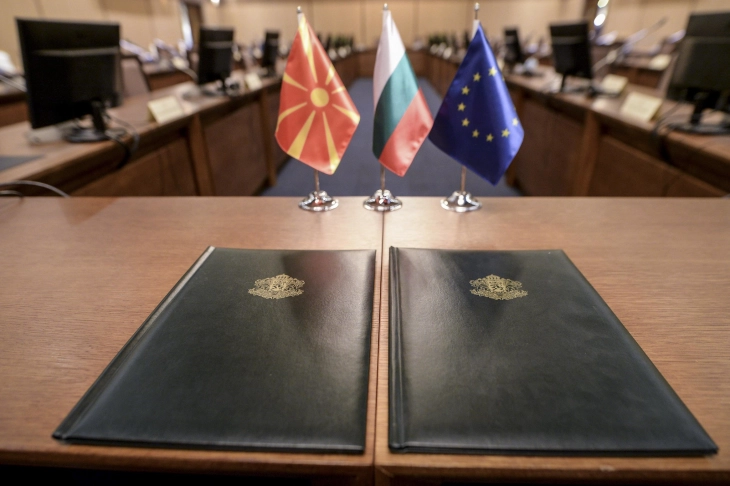French proposal “unacceptable” for 57% of people: research

Skopje, 19 September 2022 (MIA) – A total of 57.1% of citizens have said they’re against the French proposal, which was the condition for the removal of Bulgaria’s veto against the start of negotiations between the EU and North Macedonia, as opposed to the 27.2% of people who accept this document – an approximately 30% difference, according to the latest research conducted by the Konrad Adenauer Foundation as part the “30 Years of Foreign Policy and Defense” publication.
The research shows that Macedonian-Bulgarian relations are at an all-time low, which can negatively affect the quality of elementary communication between the institutions and societies of both countries.
In relation to EU and NATO support, 64.2% of surveyed people support North Macedonia’s NATO membership, a 2:1 ratio in favor of supporters. 56.2% of the survey participants believe that the NATO membership made North Macedonia safer and more stable.
63.8% were in favor of North Macedonia’s EU membership, a percentage which still displays clear negative trends in comparison to the first two decades of independence, according to the Foundation.
Cumulatively, 40.2% of participants blame domestic weaknesses for the country’s failure to get into the EU, as opposed to the 19.2% finding the reasons in external factors.
The survey participants have the most positive impressions of the quality of mutual relations with Turkey – 71.6%, 68.6% with Serbia and 64.3% with Germany.
59.3% and 52.5% of the survey participants believe that Russia and Bulgaria, respectively, have bad bilateral relations with North Macedonia.
A total of 45.6% of survey participants believe that North Macedonia has failed to build a professional diplomatic service over the past three decades, as opposed to the 21.8% who believe the opposite. The conclusion is that the people have increased trust in the Army and defense institutions as opposed to diplomacy.
Out of all presidents of the country, on a scale of 1-5, the survey participants have given the highest score to the second President, Boris Trajkovski, with an average grade of 4.28, followed by the first President of the Independent Republic of Macedonia Kiro Gligorov with an average grade of 4.1, followed by the third President Branko Crvenkovski’s 3.02, followed by Gjorge Ivanov’s 3.11, and last is the current President Stevo Pendarovski with an average score of 2.81.
36.5% of participants are in favor of the Prespa Agreement. 30.6% believe that the relations between North Macedonia and Greece have improved after the name dispute was solved, and 30% believe that the solving of the name dispute positively influenced the Ecumenical Patriarchate’s decision to recognize the Macedonian Orthodox Church - Ohrid Archbishopric as autonomous on May 9 2022. Despite the still-present reservations, Macedonian-Greek relations are characterized by a positive dynamic.
64.6% of participants believe that Germany is a strong political supporter and ally, while an additional 66.6% believe that it’s also an important economic partner to North Macedonia. Germany and the US are two characteristic examples of a continued, stable trust in relation to the quality of relations that these countries nurture with North Macedonia.
37.4% of participants believe that Serbia is North Macedonia’s greatest ally, 24.1% had no opinion, whereas 19.8% believe it’s the United States. 5.4% of participants believe that Turkey is this country’s greatest ally, and 12.1% of people think it’s Russia.
In contrast, 44% of participants believe that Bulgaria is the greatest enemy to North Macedonia, and 12.1% believe this title should go to Russia.
50.4% believe that the military aggression of Russia against Ukraine is unacceptable and unjustified, as opposed to 26.2% who think the opposite.
65.7% of participants support the Open Balkan project, as opposed to the 15% who don’t, which means that the number of participants who are in favor of this form of close cooperation between North Macedonia, Albania and Serbia has increased by 50.7%.
28% of participants believe that North Macedonia will never get into the EU, 23.7% had no response or said that they didn’t know when this would happen. 7.4% of participants stated that this country will enter the EU in 20+ years, 10.4% believe it’ll happen within 10-20 years, 15.5% believe it’ll happen in 10 years, and 13% believe it’ll happen in 5 years. These responses show a deep pessimism concerning North Macedonia’s EU membership, as well as the speed at which this strategic goal will be realized.
“Once the bilateral obstacles and the opening of a clear perspective for a dynamic integration of North Macedonia with no additional blockades, the citizens’ impressions of the Union and the accession time will change for the better,” according to the document.
The publication consists of a theoretical analysis and a public opinion survey, aiming to shed additional light onto these two aspects of this country’s modern history. The public opinion survey was conducted in August of this year, surveying 1111 participants, retaining a general ratio in terms of basic demographic characteristics, such as sex, age over 18, ethnicity, profession and education, whilst also honoring appropriate geographical balancing. dk/ba/







